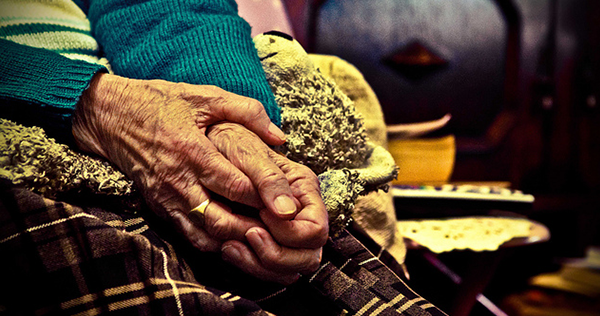
In the last few years before her death, the aged mother of my lovely bride lived in a small apartment in a castle for elderly people in gently failing health. I would visit her there almost every Saturday afternoon, not from a sense of duty but because I liked her wit and erudition and masterful passive-aggression, which was so layered and subtle that I found myself enjoying it immensely as a form of verbal art. There are a lot of ways to be an artist and one way is to be brilliant at saying things that mean the opposite of what you say.
I would knock on her door, even if it was slightly ajar, as it usually was, for she loved to be aware of the passing parade, and she would weakly bid me to enter. I would shuffle in and announce cheerfully that I could only stay a few minutes, which was my opening salvo, and then we would begin a sort of conversational chess game, during which I would ask after her health, and she would say she felt well, and I would say that means everything hurts, and she would say well not everything, and then we would happily discuss her lengthy litany of ills and aches, and compare notes on what parts of our ships were breaking down in the most shocking and offensive manner, such that if you had bought them at a store you would be entitled to triple your money back given the egregious rate of decomposition and shoddy workmanship.
As soon as she said the word workmanship I would pounce, and accuse her of insulting the Force that started the universe into being, and she would pretend to be shocked at my insinuation, and then she would ask me innocently about my Mass attendance, and I would ask her innocently about the various boyfriends she had before she met her beloved late husband, and how many times exactly had she kissed each one and where the nefarious deed was done, and she would giggle in the helpless infectious way a four-year-old giggles, and then we would switch to literature, but not before she made the ritual offer to get up and make me tea, which I ritually declined, but knew to be a signal for me to get up and get her a cookie from the blue cookie jar, which she really ought not to have, she would say, because I am so fat, and I have decided that today is the day I will go for a long walk, definitely this will happen today, perhaps right after you leave so soon, you must be so very busy to have to rush off like this each time, I am so impressed at how you manage to find time to visit a poor old lady, how very kind of you.
She never went for that walk, and it took me a few visits to realize that she did not really want me to stay longer, for that would reduce and dilute the pleasurable pitch of our brief amused play for two actors; and after we talked books for a few minutes (and here she had me, for she was the sort of reader who had read all of Trollope and remembered it too, which is a remarkable sort of reader, but she had a weakness for lesser poetry, which I exploited if I felt she had me on the ropes—she would be questioning me closely about Edward Gibbon and I would innocently mention Ella Wheeler Wilcox or Alfred Marmaduke Hobby and ask why her beloved 19th-century poets had to have three names, what was the deal there? and she would giggle that great giggle again), then it was time for me to go.
I would rise and she would not, for she was old and she lived in that soft throne of a reading chair, and I would reach down and cup her face for an instant, as a form of hug or kiss, and then I would go, and we would banter as I went, for banter was our language, a way to say things without saying them; and this Saturday morning, like many other Saturday mornings since she died, I miss that. As I got to the door I would ask if she wanted another cookie and she would say, I am so fat! and every once in a while now I really want to hear her voice in the next room saying just exactly that.

